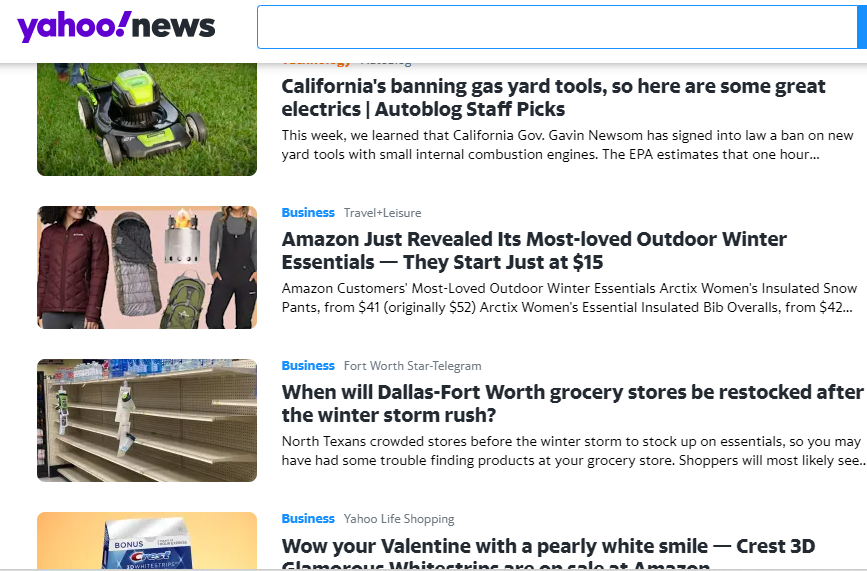Yahoo News: News for Yahoos?
The longtime aggregator is now serving mostly non-news content.

Like a lot of you, I suspect, aggregators have been my primary means of finding news articles for years. In the olden days, I took a daily newspaper and subscribed to several weekly news magazines. By twenty years ago, I was mostly using online sources but cycling through my bookmarks of newspapers, online-only publications like Slate, and various blogs. But, eventually, sites like Google News, YahooNews, and Memeorandum were my first stops with particular sites an afterthought.
For most of that period, Google and Yahoo were more-or-less indistinguishable to me. Recently, though, the latter has become something very different. Even though Google is first and foremost an advertising company, its ads are mostly easily distinguishable. Increasingly, Yahoo’s articles are mostly poorly-disguised ads.
To be sure, the very top of the page is still real news content:

Six articles, five of which are news and one of which is a human interest story that deals with, arguably, our most pressing news item and potentially combats the indifference to it shared by too many.
But that’s immediately followed by this:

Three of those stories are straight-up ads and the fourth is a local news story about stores halfway across the country that details, store by store, what the inventory looks like. The next handful of stories are a combination of other local stories that aren’t local to me (and, yes, Yahoo knows where I live, as it displays the adjacent town’s weather in the right sidebar even though I’m not signed in), various other ads disguised as news stories, and various “weird news” stories.
To be sure, there’s still news content to be found but it’s now the minority of content.
And even a lot of what is arguably “news” is clickbait crap like “Amazon Prime Fee Rising to $180, Not $139, for Many Members.” Yes, they got me on this one. We order a ton from them, so it’s not implausible that they’re going to jack up the rates on high-volume customers. But, no, $180 is the annualized rate for those who pay monthly. It’s useful for the innumerate to be aware that the monthly rate is substantially higher, I guess, but the increase is $2/month, or $24/year, which is proportional to the $20 increase for pay-up-front annual customers.
Relatedly—and, granted, this is hardly unique to Yahoo—there are an inordinate number of stories that are what I call Stupid Internet News. These are ostensible news articles based on, for example,
- a page on the “Am I The Asshole” subreddit
- a one-liner from some late-night comedy host’s standup routine
- an aggregation of tweets from random yahoos
Obviously, I’m no longer the target audience and I can just cross them off my list. But I must admit to befuddlement over this new business model.






Aside from Apple news, which I removed from my phone and iPad within a week, I wasn’t even aware of aggregators. I’m not sure I get the appeal?
It’s Shakespearean. Alas poor Yahoo, how far you have fallen.
Even actual news that shows up in Yahoo’s feed is typically not that useful, due to the treatment that it received from the generating publication.
To damn Yahoo is faint praise, it’s better quality than Qanon.
@MarkedMan: As the name implies, aggregators scour for news on a wide variety of sites and brings it together in a single place. Done correctly, it draws attention to important stories I might otherwise have missed because the coverage was at a place—for example, Rolling Stone—that I would otherwise never visit.
@James Joyner: You don’t feel it suffers from the (???) effect? (I’m trying to remember the name of it but it’s a problem YouTube has been working on for years. If you use algorithms to suggest videos, and people regularly accept the suggestions, they will eventually all go the same video feed. I don’t remember what’s on it, but the effect is named for one of the videos. It’s like the “Rick Ocasek” effect or the “Cat Playing Piano” effect.) In any case, I would think the general trend would be to direct content to you based on the fact that you clicked on something else, either in disgust or because it reinforces you assumptions. This isn’t anything against you, I think it would be as likely to happen to anyone, including me.
This is a non-local example of what I was talking about in the local news discussion in yesterday’s forum. Yahoo doesn’t appear to be doing this in pursuit of a particular political agenda. It’s just become a bad news source because it’s just low effort and completely focused on driving traffic for the minimum cost.
Suggesting Yahoo News would improve if people started sending them money to “support journalism” is wishful thinking.
I’m not sure that what you’ve observed is particularly new. Yahoo is my usual web smurfing start point and has been since I started using the internet. While I was in Korea, I went scrolled through Yahoo’s feed (or whatever you call it) quite a bit and most of it was ads, celebrity news, infomercials, and what not. That’s a decade ago. On the other hand, I wasn’t looking for “news” on Yahoo; I subscribed to a newspaper for news. I was looking for connections to Americana-type stuff so that I could keep in touch with my culture–warped as it is.
Go to Yahoo for news? Meh… not so much. The Joe Rogan “revelation” that I commented on in the Forum this morning came from Yahoo, and that may well be typical of what passes for news there. Even the top of the page is pretty fluffy–and has been for a long time.